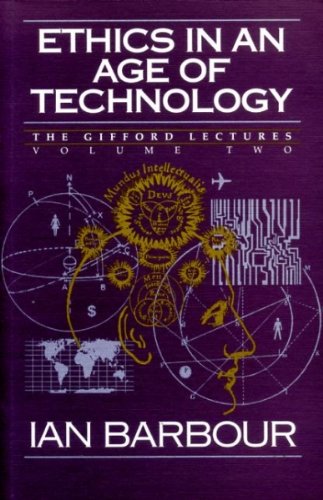Items related to Ethics in an Age of Technology (Harper's Library...

The Gifford Lectures have challenged our greatest thinkers to relate the worlds of religion, philosophy, and science. Now Ian Barbour has joined ranks with such Gifford lecturers as William James, Carl Jung, and Reinhold Neibuhr. In 1989 Barbour presented his first series of Gifford Lectures, published as Religion in an Age of Science. In 1990 he returned to Scotland to present his second series, dealing with ethical issues arising from technology and exploring the relationship of human and environmental values to science, philosophy, and religion and showing why these values are relevant to technological policy decisions.
In examine the conflicting ethics and assumptions that lead to divergent views and technology, Barbour analyzes three social values: justice, participatory freedom, and economic development. He defends such environmental principles as resource sustainability, environmental protection, and respect for all forms of life. He present case studies in agriculture, energy policy, genetic engineering, and the use of computers. Finally, he concludes by focusing on appropriate technologies, individual life-styles, and sources of change: education, political action, response to crisis, and alternative visions of the good life.
"synopsis" may belong to another edition of this title.
Ian G. Barbour has retired from Carleton College where he was professor of physics, professor of religion, and Bean Professor of Science, Technology, and Society. The "preeminent synthetic in the field" (Cross Currents,) he is the author of several influential books, including Ethics in an Age of Technology and Myths Models, and Paradigms, which was nominated for the National Book Award. He gave the world-renowned Gifford Lectures, 1989-1991.
"About this title" may belong to another edition of this title.
- PublisherHarper San Francisco
- Publication date1993
- ISBN 10 0060609346
- ISBN 13 9780060609344
- BindingPaperback
- Number of pages312
- Rating
Shipping:
US$ 10.95
From Canada to U.S.A.
Top Search Results from the AbeBooks Marketplace
Ethics in an Age of Technology: The Gifford Lectures, 1989-1991, Volume 2
Book Description Hardcover. Condition: Fine. Dust Jacket Condition: Fine. 1st Edition. Hardcover in dust jacket. Light shelf wear. Otherwise clean, tight, and unmarked. Very neat. Size: 8vo - over 7¾ - 9¾" tall. Book. Seller Inventory # 61868w66

